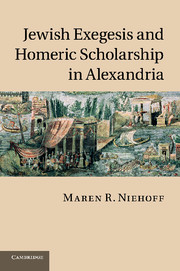Book contents
- Frontmatter
- Contents
- Acknowledgements
- List of abbreviations
- 1 Setting the stage
- Part I Early Jewish responses to Homeric scholarship
- Part II Critical Homeric scholarship in the fragments of Philo's anonymous colleagues
- 5 Comparative mythology
- 6 Historical perspectives on Scripture
- 7 Traces of text criticism among Alexandrian Jews
- Part III The inversion of Homeric scholarship by Philo
- Epilogue
- References
- Index of Greek terms
- Index of sources
- Index of modern authors
- General index
6 - Historical perspectives on Scripture
Published online by Cambridge University Press: 03 May 2011
- Frontmatter
- Contents
- Acknowledgements
- List of abbreviations
- 1 Setting the stage
- Part I Early Jewish responses to Homeric scholarship
- Part II Critical Homeric scholarship in the fragments of Philo's anonymous colleagues
- 5 Comparative mythology
- 6 Historical perspectives on Scripture
- 7 Traces of text criticism among Alexandrian Jews
- Part III The inversion of Homeric scholarship by Philo
- Epilogue
- References
- Index of Greek terms
- Index of sources
- Index of modern authors
- General index
Summary
In this chapter we continue to investigate traces of Philo's colleagues and predecessors, whose work is reflected in his reactions to them. A fragment of considerable size is preserved in Philo's biography of Abraham. Philo seems to quote here from a written source, reporting at length what ‘they say’ (ϕασί). This fragment from a lost work of Philo's colleagues throws further light on the diversity of Alexandrian Judaism and enables us to reconstruct one additional aspect of the general picture. While the exegetes quoted in De Abrahamo will be shown to belong to an Aristotelian milieu, they must not on this account be identified with the interpreters of the story of the Tower of Babel whom we have encountered in the previous chapter. The fragment discussed in this chapter will rather illuminate the rich diversity of the Aristotelian scholarly tradition among Jewish Bible exegetes in Alexandria.
The fragment in De Abrahamo points to a lively discussion among Alexandrian Jews concerning the legitimacy of historical approaches to Scripture. The question arises whether Scripture evolved over time and implies a development of the religion or instead reflects an eternal, unchanging truth. I shall argue that the above mentioned fragment is of the utmost significance in this context. When analysed with a view to contemporary Alexandrian scholarship, it emerges as a highly academic interpretation of the Binding of Isaac in the context of ancient practices of child sacrifice.
- Type
- Chapter
- Information
- Jewish Exegesis and Homeric Scholarship in Alexandria , pp. 95 - 111Publisher: Cambridge University PressPrint publication year: 2011



